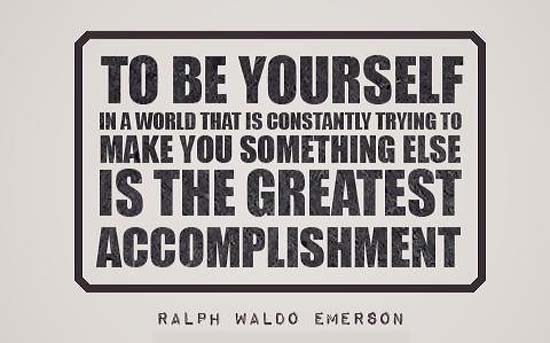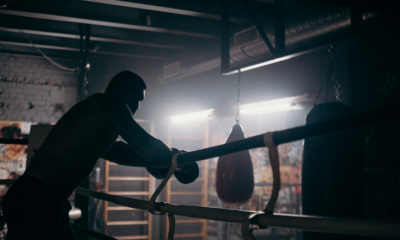Life
12 Reasons To Stop Photoshopping Your Life

“Just be yourself”. We’ve all heard the golden rule a thousand times before, yet how many of us can honestly say we openly expose the complete, unedited version our authentic self for the world to see – blemishes and all?
Whether we’re talking a subtle retouching of our perceived imperfections, or a gaping chasm between the mask we wear in public and the true self hidden within, almost everyone is holding onto some heavily conditioned beliefs around what we must present to the world in order to fit in, be accepted, liked and loved. But the extent to which this airbrushing of inauthenticity can be negatively impacting our lives and may go deeper than you think.
Reasons To Be More Authentic
1. A recipe for regret
Living in alignment with someone else’s ideals rather than your own will generally set you on an unfulfilling journey toward disappointment, regardless of what you achieve. No matter how much you tick off the socially prescribed wish list or how many peoples’ expectations you manage to please, the pain of regret for not taking the wheel of your life and driving it along the road of your true purpose is rarely subtle enough to escape.
2. Holding back the tide
If you’re holding back the authentic you from shining, you’re stemming the flow of your true personal power and depriving the world of all you’re capable of bringing into it. You are the best there is at being you – so why not do it with pride? When we decide to try and live by or compare to someone else’s path, we resign ourselves to playing smaller than where our unique magnificence can take us.
As Judy Garland put it:
“Always be a first-rate version of yourself, instead of a second-rate version of somebody else”.
3. Eroding self-worth
Any belief that the real version of you needs to be edited and polished before being fit to put on display implies to your true self that it’s somehow not good enough, lacking or that there’s clearly something wrong with you.
Regardless of what you may be portraying on the surface, living incongruently with your authentic self is a hotbed for cultivating a damaging low sense of worth that the world cannot help but reflect right back at you.
4. Forever vanilla
People are magnetised to a leader who stands out from the crowd and freely allows their unique flavour of magnificence to shine – the few who really live and own their authentic truth, irrespective of what anyone else might think. Those who go seeking acceptance, admiration and respect by striving to fit into the model of what they think everyone wants are destined to blur into the faceless vanilla herd.
5. The inhuman touch
Allowing your true self to be vulnerable is the key to opening up the greatest level of connection with others. In a mask-wearing world people delight in the liberation of being able to let down their guard and truly be themselves, and in sharing our so-called “imperfections” we give others permission to do the same. Think of those you are drawn to open up around and how that makes you feel, versus the depth of relationship you are able to experience with someone presenting a seemingly perfect disguise.
“The only normal people are the ones you don’t know very well” – Joe Ancis
6. Living in fear
When the persona you present to the world is anything other than completely authentic, you live with the constant threat of being “found out” and carry around a restrictive burden of unease that any parts not congruent with this ideal must remain firmly locked away. When you fully own your truth and openly wear your heart on your sleeve there is nothing to hide and nothing more to fear – your complete vulnerability creates an empowering invincibility.
7. Shields up
In order to maintain a strong façade and protect our full self being exposed, we tend to develop some pretty effective defences. Sadly, these generally have the opposite effect to inviting the belonging and connection we’re really seeking as they’re mostly designed to keep others at a comfortable distance from ever engaging too deeply or entering into your life beyond the boundaries that you patrol.
8. Who do you think you’re fooling?
People can sense far deeper than the surface level of interaction that you’re able to paint. They know it. You know it. And the flimsier the authenticity of this polished exterior, the more powerful unconscious conversation is going on at the unseen “gut feeling” level.
As Ralph Waldo Emerson said:
“Who you are shouts so loudly in my ears that I can’t hear what you’re saying”.
9. Conditional love
The more you openly give of your true self in a relationship determines the depth of love and fulfilment you can experience in that connection. Yet some people still find themselves filtering the thoughts, feelings and behaviours they are comfortable to share with even their closest companion. To experience the divinity of unconditional love there must be a willingness to expose the rawest version of your soul, or you’ll never feel truly accepted for anything but the polished façade you present.
10. Stunted growth
The most impactful relationship in your life is the one you have with yourself – but how willing are we to look deeply into our own truth, honestly accept our imperfections and know ourselves for who we really are? Only when we step aside from the distortions of our ego and clearly see where the gaps are can we invite the real change, growth and progress that will actually fill them, rather than simply painting over the cracks with a fresh coat of denial.
11. Wasting energy
Let’s face it, ensuring you’re on the ball to keep up appearances all the time can involve a lot of effort, energy and exhausting tension that could be much better spent elsewhere. How many more miles to the gallon could you achieve with the life energy that effortlessly flows through you when you cast off the shackles, step into your true essence and dance like nobody’s watching?
12. Short-changing yourself
In the end, donning the protective gear that keeps our authentic self at a safe distance from exposure to the possible bumps and bruises along the journey of life also prevents us from ever wholeheartedly embracing the highest highs. Diluting how much of ourselves we are willing to unreservedly throw into anything we do only waters down any reward we can ever genuinely receive. Real fulfilment comes with living freely, living fully and living your truth.
“The privilege of a lifetime is to become who you truly are.” – C.G. Jung
Did You Know
How Skilled Migrants Are Building Successful Careers After Moving Countries
Behind every successful skilled migrant career is a mix of resilience, strategy, and navigating systems built for locals.

Moving to a new country for work is exciting, but it can also be unnerving. Skilled migrants leave behind familiar systems, networks, and support to pursue better job opportunities and a better future for their families. (more…)
Life
10 Research-Backed Steps to Create Real Change This New Year
This New Year could finally be the one where you break old patterns and create real, lasting change.

Every New Year, we make plans and set goals, but often repeat old patterns. (more…)
Life
9 Harsh Truths Every Young Man Must Face to Succeed in the Modern World
Before chasing success, every young man needs to face these 9 brutal realities shaping masculinity in the modern world.

Many young men today quietly battle depression, loneliness, and a sense of confusion about who they’re meant to be.
Some blame the lack of deep friendships or romantic relationships. Others feel lost in a digital world that often labels traditional masculinity as “toxic.”
But the truth is this: becoming a man in the modern age takes more than just surviving. It takes resilience, direction, and a willingness to grow even when no one’s watching.
Success doesn’t arrive by accident or luck. It’s built on discipline, sacrifice, and consistency.
Here are 9 harsh truths every young man should know if he wants to thrive, not just survive, in the digital age.
1. Never Use Your Illness as an Excuse
As Dr. Jordan B. Peterson often says, successful people don’t complain; they act.
Your illness, hardship, or struggle shouldn’t define your limits; it should define your motivation. Rest when you must, but always get back up and keep building your dreams. Motivation doesn’t appear magically. It comes after you take action.
Here are five key lessons I’ve learned from Dr. Peterson:
-
Learn to write clearly; clarity of thought makes you dangerous.
-
Read quality literature in your free time.
-
Nurture a strong relationship with your family.
-
Share your ideas publicly; your voice matters.
-
Become a “monster”, powerful, but disciplined enough to control it.
The best leaders and thinkers are grounded. They welcome criticism, adapt quickly, and keep moving forward no matter what.
2. You Can’t Please Everyone And That’s Okay
You don’t need a crowd of people to feel fulfilled. You need a few friends who genuinely accept you for who you are.
If your circle doesn’t bring out your best, it’s okay to walk away. Solitude can be a powerful teacher. It gives you space to understand what you truly want from life. Remember, successful men aren’t people-pleasers; they’re purpose-driven.
3. You Can Control the Process, Not the Outcome
Especially in creative work, writing, business, or content creation, you control effort, not results.
You might publish two articles a day, but you can’t dictate which one will go viral. Focus on mastery, not metrics. Many great writers toiled for years in obscurity before anyone noticed them. Rejection, criticism, and indifference are all part of the path.
The best creators focus on storytelling, not applause.
4. Rejection Is Never Personal
Rejection doesn’t mean you’re unworthy. It simply means your offer, idea, or timing didn’t align.
Every successful person has faced rejection repeatedly. What separates them is persistence and perspective. They see rejection as feedback, not failure. The faster you learn that truth, the faster you’ll grow.
5. Women Value Comfort and Security
Understanding women requires maturity and empathy.
Through books, lectures, and personal growth, I’ve learned that most women desire a man who is grounded, intelligent, confident, emotionally stable, and consistent. Some want humor, others intellect, but nearly all want to feel safe and supported.
Instead of chasing attention, work on self-improvement. Build competence and confidence, and the rest will follow naturally.
6. There’s No Such Thing as Failure, Only Lessons
A powerful lesson from Neuro-Linguistic Programming: failure only exists when you stop trying.
Every mistake brings data. Every setback builds wisdom. The most successful men aren’t fearless. They’ve simply learned to act despite fear.
Be proud of your scars. They’re proof you were brave enough to try.
7. Public Speaking Is an Art Form
Public speaking is one of the most valuable and underrated skills a man can master.
It’s not about perfection; it’s about connection. The best speakers tell stories, inspire confidence, and make people feel seen. They research deeply, speak honestly, and practice relentlessly.
If you can speak well, you can lead, sell, teach, and inspire. Start small, practice at work, in class, or even in front of a mirror, and watch your confidence skyrocket.
8. Teaching Is Leadership in Disguise
Great teachers are not just knowledgeable. They’re brave, compassionate, and disciplined.
Teaching forces you to articulate what you know, and in doing so, you master it at a deeper level. Whether you’re mentoring a peer, leading a team, or sharing insights online, teaching refines your purpose.
Lifelong learners become lifelong leaders.
9. Study Human Nature to Achieve Your Dreams
One of the toughest lessons to accept: most people are self-interested.
That’s not cynicism, it’s human nature. Understanding this helps you navigate relationships, business, and communication more effectively.
Everyone has a darker side, but successful people learn to channel theirs productively into discipline, creativity, and drive.
Psychology isn’t just theory; it’s a toolkit. Learn how people think, act, and decide, and you’ll know how to lead them, influence them, and even understand yourself better.
Final Thoughts
The digital age offers endless opportunities, but only to those who are willing to take responsibility, confront discomfort, and keep improving.
Becoming a man today means embracing the hard truths most avoid.
Because at the end of the day, success isn’t about luck. It’s about who you become when life tests you the most.
Change Your Mindset
The Four Types of Happiness: Which One Are You Living In?
Most people chase success only to find emptiness, this model reveals why true happiness lies somewhere else.

In a world driven by rapid technological growth and constant competition, many people unknowingly trade joy for achievement. (more…)
-

 News3 weeks ago
News3 weeks agoBrandon Willington Builds 7-Figure Business by Ignoring Almost Everything
-

 Health & Fitness3 weeks ago
Health & Fitness3 weeks agoWhat Minimalism Actually Means for Your Wellness Choices
-

 Did You Know3 weeks ago
Did You Know3 weeks agoWhy Most Online Courses Fail and How to Fix Them
-

 Business3 weeks ago
Business3 weeks agoIf Your Business Internet Keeps Letting You Down, Read This
-

 Business2 weeks ago
Business2 weeks agoEntrepreneur’s Guide to Pay Stubs: Why Freelancers and Small Business Owners Need a Smart Generator
-

 Business1 week ago
Business1 week agoThe Salary Shift Giving UK Employers An Unexpected Edge
-

 Business1 week ago
Business1 week agoThe Simple Security Stack Every Online Business Needs
-

 Scale Your Business1 week ago
Scale Your Business1 week ago5 Real Ways to Grow Your User Base Fast































1 Comment